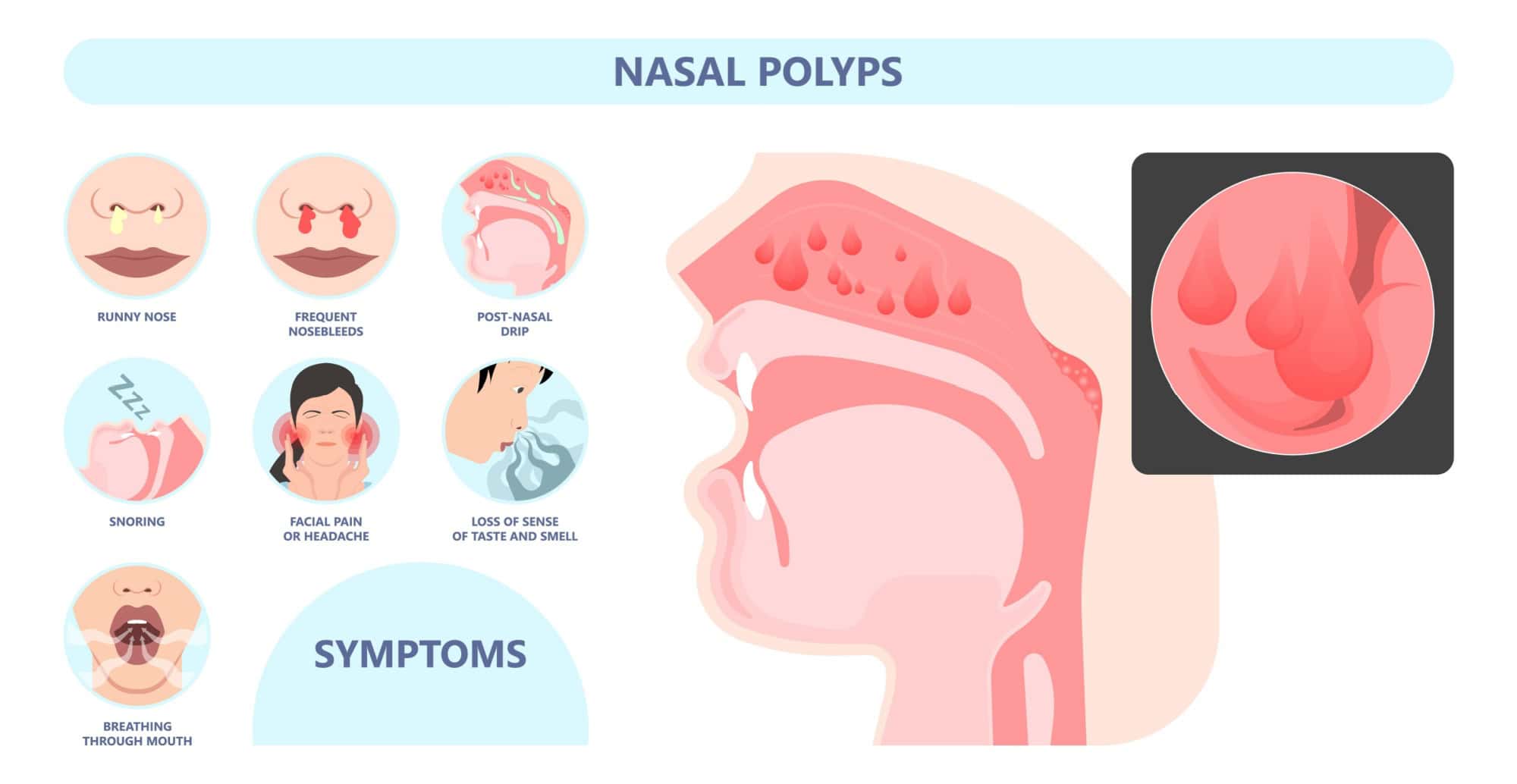Breathing should be effortless.
Yet, for many, nasal polyps disrupt this simple act. Imagine a persistent feeling of congestion, an unrelenting blockage that complicates every breath.
Nasal polyps, often unnoticed but profoundly impactful, can turn the breathing routine into a struggle.
What Are Nasal Polyps?
Nasal polyps are usually non-cancerous outgrowths of the nasal mucosa. The nasal mucosa refers to inner lining the nasal cavity and sinuses.

Nasal Polyps Can Affect One’s Sleep
Mechanical obstruction of the nasal passage by the polyps, together with nasal inflammation and congestion, leads to snoring and apnoea.
Someone experiencing these difficulties ends up with poor quality of sleep that can lead to an increased risk of various medical conditions such as heart problems.
How Do Nasal Polyps Come About?
Nasal polyps are mainly due to the long-standing inflammation or irritation of the mucosa, which is lining cells and layers of the nasal cavity and sinuses.
Such inflammation or irritation is known as chronic rhinosinusitis or CRS.
Crs Is Commonly Related to Various Types of Allergies
Long-standing allergies lead to the formation of multiple large polyps.
The longer the allergy, the more severe the presentation becomes. Consequently, treatment will become more challenging.
Hence, the earlier CRS is detected, the better. When detected early, CRS can be treated promptly with good control of the underlying allergies.
Careful, once the allergies recur, polyps can follow!
How Crs Is Treated
The main goal of treatment of nasal polyps is to reduce the inflammation that causes the polyps.
Once the inflammation is controlled, the polyps will normally shrink in size, especially if it is small or in its early stage.
Steroid Sprays
These sprays remain the first-line treatment to achieve this.
Surgery
The second line for non-responsive cases or bigger polyps would be surgery. See the table for more details.
Surgical options come into play as the first option when the polyps are not allergic in nature, such as antrochoanal polyps or polyps of suspected neoplastic origin.
Surgery Is Often Considered in the Following Circumstances:
- Worsening symptoms.
- Progressively enlarging polyps.
- Recurrent sinus infections.
- Decreased sense of smell and taste.
- Breathing difficulties.
- Sleep disturbances.
- Worsening asthma attacks.
- Complications that affect the orbit, which is the bony cavity that contains the eyeball (orbital complications) with, rarely, complications involving the cranium or the skull cavity (intracranial complications).
Let’s Talk About the Surgery
Short Downtime
It is a simple day-care procedure for medically fit patients with no contraindications; they can often return home on the same day.
Otherwise, a slightly longer stay of 2 to 3 days will suffice.
Potential Side Effects
The side effects are minor self-limiting bleed, mild discomfort, crusting, redness, and temporary distorted sensation of smell.
Mechanical injuries to the neighbouring structures, such as the eye and skull base, are uncommon.
Post-surgery Care
Post-surgery care is a highly important determinant of surgical success.
Regular nasal saline irrigation and regular sinus cavity debridement are recommended in early post-operative care interventions.
Post-operative antibiotics and systemic steroids are catered for on a patient-to-patient basis.
Moisture is critical for proper healing. Patients will need to moisturise and douche their nose at least 3 to 4 times a day, and for at least 4 to 6 weeks after surgery.
Monoclonal Antibodies Are a Newer Group of Treatments Found Effective for Recurrent Polyps Unamendable for Steroid and Surgical Intervention
Aspirin-exacerbated respiratory disease (AERD), also known as Samter’s Triad, is a chronic medical condition that consists of three clinical features: asthma, sinus disease with recurrent nasal polyps, and sensitivity to aspirin and other non-steroidal anti-inflammatory drugs.
Monoclonal antibodies show a promising outcome in these cases. However, this treatment involves a longer duration with a higher cost of treatment.
Other Non-Invasive Treatments Available in Malaysia for Nasal Polyps
Oral corticosteroids can be a non-specific consideration for nasal polyps. It is advised to be taken for a short term, bearing in mind the side effects, leading to the recurrence of polyps once suspended.
A newer tool of steroid-impregnated sinus implant is available overseas, but it is still in its early stage of proven effectiveness.
This article first appeared in HealthToday, 1 April 2024.
分享:
这篇文章对您有帮助吗?
2024 年 4 月 21 日
-3 分钟阅读
An Expert Offers Important Facts and Advice on Living with Nasal Polyps
了解更多有关耳鼻喉科的信息Columbia Asia
了解更多分享:
这篇文章对您有帮助吗?

